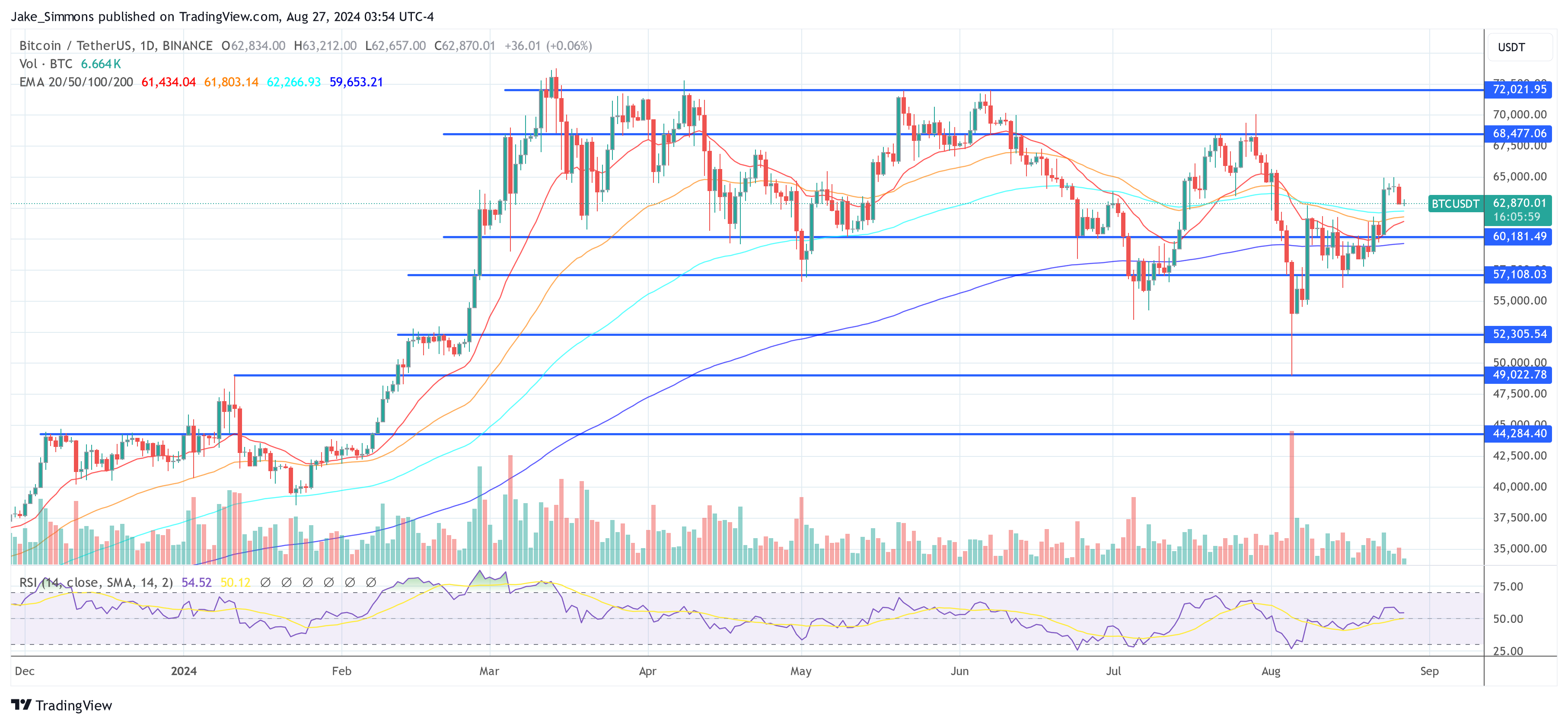Expert Explains Why Bitcoin Price Could Explode To $1 Million This Cycle
In the latest episode of the What Bitcoin Did Podcast, hosted by Peter McCormack, Jack Mallers, CEO of Strike, made a stunning prediction for the Bitcoin price. Mallers speculated that BTC could reach a valuation between $250,000 to $1 million in the current economic cycle. Mallers grounded his prediction in the broader context of global economic practices and central bank policies, emphasizing the unprecedented nature of today’s financial challenges and opportunities. Why Bitcoin Is Poised To Reach $1 Million Mallers highlighted the global debt-to-GDP ratio, which has surged beyond 300%, as a critical indicator of economic imbalance. “Global debt tells you how much time and energy from the human population and its future have been borrowed,” Mallers explains. He argues that this disproportionate ratio signals that governments are borrowing future resources extensively without a feasible plan for repayment. This practice, he suggests, is akin to borrowing from future generations, reducing their potential quality of life and economic freedom. Related Reading: Here’s When Bitcoin Is Predicted To Break Its All-Time High If History Repeats “Looking at Global debt, you can see how much time and energy from the human population and its future have been borrowed. Then if you look at the growth which is what that metric tells us […] they’ve borrowed a lot of our future and a lot of our time and energy with no way to pay it back,” Mallers remarked. The Strike CEO is concerned that this could lead to significant economic and social challenges, particularly as governments struggle to manage these debts without resorting to measures such as currency debasement. Currency debasement, a reduction in the value of money caused by increasing the money supply, is seen by Mallers as a likely governmental response to unsustainable debt levels, which could erode wealth and savings at an individual level. “I think everyone’s speculation is that currency debasement is the way out for the government. You can steal the time and energy of everyone alive,” Mallers argues. In this context, Mallers positions Bitcoin as a critical tool for financial autonomy. By converting their wealth into Bitcoin, individuals can opt out of their government’s economic mismanagement and protect their assets from inflation and potential currency devaluation. He emphasizes that Bitcoin’s fixed supply—capped at 21 million coins—makes it immune to the inflationary tactics that governments might employ, unlike fiat currencies which can be printed at will. Related Reading: Bitcoin Tops & Bottoms Occur When This Metric Spikes, Analytics Firm Reveals Mallers is particularly critical of central banks’ practices, especially their manipulation of economic cycles through market interventions. He argued that these interventions have prevented necessary economic adjustments and purgings of inefficiency that are essential for healthy economic dynamics. Such actions have stymied the natural entropy of economic systems, leading to artificially stabilized but fundamentally vulnerable markets. “I’ve been on record saying I think Bitcoin is going to $250,000 to $1 million long before Trump or any of these rumors or whatever else it’s solely predicated on we’re likely to see the greatest asset bull market in the history of bull markets. why? because central banks have progressively price fixed everything whenever something breaks. they don’t let the business cycle complete,” Mallers predicts. Central to his critique is the role of central banks in the bond market. Unlike other markets like real estate and equities, which have seen significant interventions to maintain stability, the bond market remains less protected, according to Mallers. This market is crucial as it underpins much of the global financial system, including the strategies governments use to manage public finances. Mallers predicts a scenario where central banks might soon find themselves unable to maintain control over the bond market without resorting to extreme measures such as massive money printing. He projects that such actions would likely result in an asset price inflation unseen in any prior market cycle. Mallers forecasts: “So this is the cycle where central banks try and price fix the bond market. The quantity of money printing will be astronomical, you’re going to get 2, 3, 4 or 5 COVID’s worth of printing and I think it’s going to send assets astronomically. High gold, real estate, equities. All right and then Bitcoin is the only truly fixed asset we’ve ever had, and so Bitcoin will outperform everything orders of magnitude.” At press time, BTC traded at $62,870. Featured image created with DALL.E, chart from TradingView.com

In the latest episode of the What Bitcoin Did Podcast, hosted by Peter McCormack, Jack Mallers, CEO of Strike, made a stunning prediction for the Bitcoin price. Mallers speculated that BTC could reach a valuation between $250,000 to $1 million in the current economic cycle. Mallers grounded his prediction in the broader context of global economic practices and central bank policies, emphasizing the unprecedented nature of today’s financial challenges and opportunities.
Why Bitcoin Is Poised To Reach $1 Million
Mallers highlighted the global debt-to-GDP ratio, which has surged beyond 300%, as a critical indicator of economic imbalance. “Global debt tells you how much time and energy from the human population and its future have been borrowed,” Mallers explains.
He argues that this disproportionate ratio signals that governments are borrowing future resources extensively without a feasible plan for repayment. This practice, he suggests, is akin to borrowing from future generations, reducing their potential quality of life and economic freedom.
“Looking at Global debt, you can see how much time and energy from the human population and its future have been borrowed. Then if you look at the growth which is what that metric tells us […] they’ve borrowed a lot of our future and a lot of our time and energy with no way to pay it back,” Mallers remarked.
The Strike CEO is concerned that this could lead to significant economic and social challenges, particularly as governments struggle to manage these debts without resorting to measures such as currency debasement. Currency debasement, a reduction in the value of money caused by increasing the money supply, is seen by Mallers as a likely governmental response to unsustainable debt levels, which could erode wealth and savings at an individual level.
“I think everyone’s speculation is that currency debasement is the way out for the government. You can steal the time and energy of everyone alive,” Mallers argues.
In this context, Mallers positions Bitcoin as a critical tool for financial autonomy. By converting their wealth into Bitcoin, individuals can opt out of their government’s economic mismanagement and protect their assets from inflation and potential currency devaluation. He emphasizes that Bitcoin’s fixed supply—capped at 21 million coins—makes it immune to the inflationary tactics that governments might employ, unlike fiat currencies which can be printed at will.
Mallers is particularly critical of central banks’ practices, especially their manipulation of economic cycles through market interventions. He argued that these interventions have prevented necessary economic adjustments and purgings of inefficiency that are essential for healthy economic dynamics. Such actions have stymied the natural entropy of economic systems, leading to artificially stabilized but fundamentally vulnerable markets.
“I’ve been on record saying I think Bitcoin is going to $250,000 to $1 million long before Trump or any of these rumors or whatever else it’s solely predicated on we’re likely to see the greatest asset bull market in the history of bull markets. why? because central banks have progressively price fixed everything whenever something breaks. they don’t let the business cycle complete,” Mallers predicts.
Central to his critique is the role of central banks in the bond market. Unlike other markets like real estate and equities, which have seen significant interventions to maintain stability, the bond market remains less protected, according to Mallers. This market is crucial as it underpins much of the global financial system, including the strategies governments use to manage public finances.
Mallers predicts a scenario where central banks might soon find themselves unable to maintain control over the bond market without resorting to extreme measures such as massive money printing. He projects that such actions would likely result in an asset price inflation unseen in any prior market cycle. Mallers forecasts:
“So this is the cycle where central banks try and price fix the bond market. The quantity of money printing will be astronomical, you’re going to get 2, 3, 4 or 5 COVID’s worth of printing and I think it’s going to send assets astronomically. High gold, real estate, equities. All right and then Bitcoin is the only truly fixed asset we’ve ever had, and so Bitcoin will outperform everything orders of magnitude.”
At press time, BTC traded at $62,870.

What's Your Reaction?




















